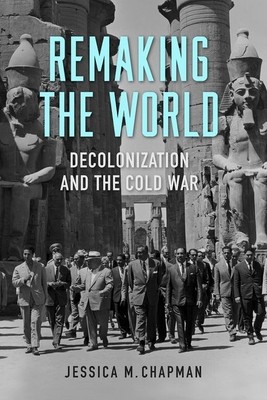
- We will send in 10–14 business days.
- Author: Jessica M Chapman
- Publisher: University Press of Kentucky
- ISBN-10: 0813197627
- ISBN-13: 9780813197623
- Format: 15.8 x 22.1 x 3.3 cm, minkšti viršeliai
- Language: English
- SAVE -10% with code: EXTRA
Reviews
Description
Between 1945 and 1965, more than fifty nations declared their independence from colonial rule. At the height of the Cold War, the global process of decolonization complicated US-Soviet relations, while Soviet and American interventionism transformed the decolonizing process.
Remaking the World examines the connections between the Cold War and decolonization, which helped define the post–World War II global order. Drawing on new scholarship, this comprehensive study provides a chronological overview from World War I to the Soviet collapse and highlights key developments in the international system as decolonization unfolded in tandem with the Cold War. Through six carefully selected case studies―India, Egypt, the Congo, Vietnam, Angola, and Iran―historian Jessica M. Chapman addresses the shifting of Soviet, American, Chinese, and Cuban policies, the centrality of modernization, the role of the United Nations, the often-outsized influence of regional actors like Israel and South Africa, and seminal post–Vietnam War shifts in the international system. Each of the case studies analyzes at least one geopolitical turning point, demonstrating that the Cold War and decolonization were mutually constitutive processes in which local, national, and regional developments altered the superpower competition.
Chapman presents a picture of the complexities of international relations and the ways in which local communist and democratic movements differed from their Soviet and American ties, as did their visions for independence and success.
EXTRA 10 % discount with code: EXTRA
The promotion ends in 23d.12:49:06
The discount code is valid when purchasing from 10 €. Discounts do not stack.
- Author: Jessica M Chapman
- Publisher: University Press of Kentucky
- ISBN-10: 0813197627
- ISBN-13: 9780813197623
- Format: 15.8 x 22.1 x 3.3 cm, minkšti viršeliai
- Language: English English
Between 1945 and 1965, more than fifty nations declared their independence from colonial rule. At the height of the Cold War, the global process of decolonization complicated US-Soviet relations, while Soviet and American interventionism transformed the decolonizing process.
Remaking the World examines the connections between the Cold War and decolonization, which helped define the post–World War II global order. Drawing on new scholarship, this comprehensive study provides a chronological overview from World War I to the Soviet collapse and highlights key developments in the international system as decolonization unfolded in tandem with the Cold War. Through six carefully selected case studies―India, Egypt, the Congo, Vietnam, Angola, and Iran―historian Jessica M. Chapman addresses the shifting of Soviet, American, Chinese, and Cuban policies, the centrality of modernization, the role of the United Nations, the often-outsized influence of regional actors like Israel and South Africa, and seminal post–Vietnam War shifts in the international system. Each of the case studies analyzes at least one geopolitical turning point, demonstrating that the Cold War and decolonization were mutually constitutive processes in which local, national, and regional developments altered the superpower competition.
Chapman presents a picture of the complexities of international relations and the ways in which local communist and democratic movements differed from their Soviet and American ties, as did their visions for independence and success.


Reviews